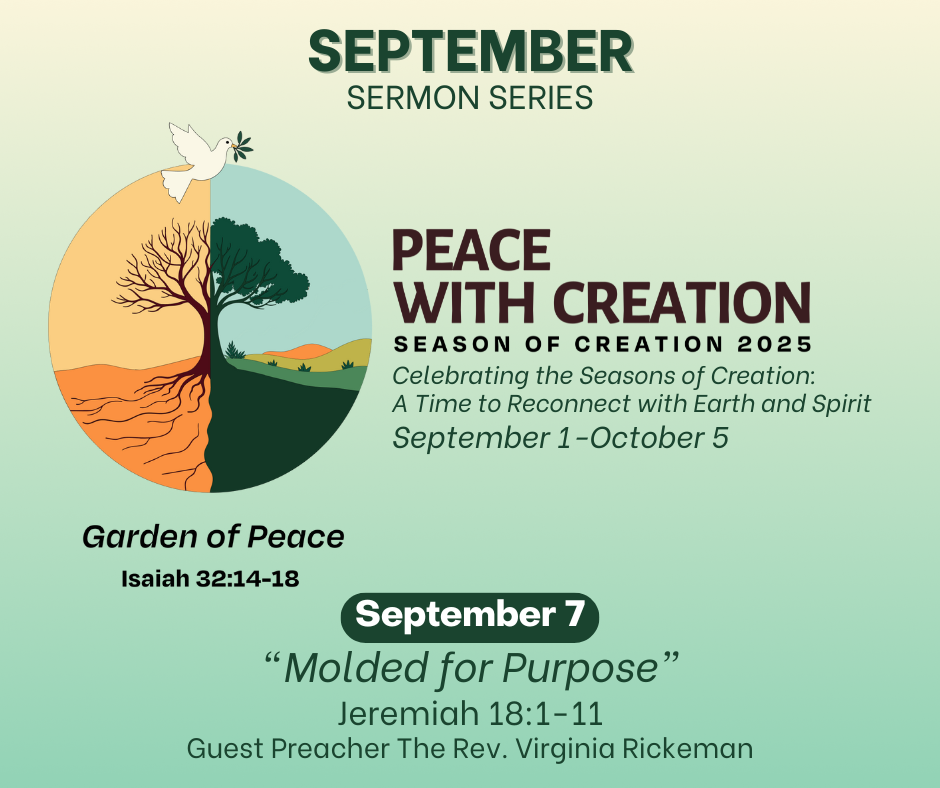Dirt. Dust. Earth. Clay. It’s remarkable how many cultures around the world begin their creation stories with dirt of some kind. “Adam” literally means either “red clay” or “dust of the ground,” that is, dirt. Actually, the entire universe is dirt.
The character, Willie Stark, in the novel All the King’s Men, wanting “dirt” on his opponents, put this spin on the word.
"Dirt's a funny thing,” the Boss said. “Come to think of it, there ain't a thing but dirt on this green God's globe except what's under water, and that's dirt too. It's dirt makes the grass grow. A diamond ain't a thing in the world but a piece of dirt that got awful hot. And God-a-Mighty picked up a handful of dirt and blew on it and made you and me and George Washington and mankind blessed in faculty and apprehension. It all depends on what you do with the dirt. That right?”
Yes, dirt’s not just a funny thing. It’s everything. Carl Sagan wrote, “The nitrogen in our DNA, the calcium in our teeth, the iron in our blood, the carbon in our apple pies were made in the interiors of collapsing stars. We are made of starstuff.”
Which is just a more refined word for dirt.
I enjoy the writings of William Bryant Logan. In 1995, he published a book entitled Dirt. As Logan was doing research for his book, he often encountered people who wanted him not to talk about “dirt” — too filthy — but soil, earth, minerals, humus, or anything but dirt. Which says something about the human lack of humility. Get over it. We are dirt.
And dirt is immensely useful for all kinds of things. Growing stuff. Making bricks, adobe, cement. Sculpting. Dirt is even useful for preaching.
Jeremiah had a difficult job made worse because he never wanted it. He never wanted it because he knew it would get him into all kinds of trouble. You don’t have to be a prophet to know that if you loudly proclaim an unpopular truth, people will try, one way or another, to silence you. Jeremiah could clearly see Israel’s destruction looming on the horizon. He desperately wanted his people, the Judah which he loved, to forsake their idols, return to the Lord God, and avoid annihilation. He tried condemnation. He tried promises. He tried to act out parables to get through to folks. One of his sermons grew out of his visit to the potter’s house.
Alas, what did he accomplish? He gave his name to the word, jeremiad, a long speech that bitterly laments the state of society, often predicting its downfall.
Heedless of Jeremiah, fall Israel did.
Now some 25 centuries later, we still have his words. What will we make of them? Do we hear a warning? Is there calamity brewing today? What is about to fall if we don’t change our ways?
“So I went down to the potter’s house, and I saw him working at the wheel. But the pot he was shaping from the clay was marred in his hands; so the potter formed it into another pot, shaping it as seemed best to him.
Then the word of the Lord came to me. He said, ‘Can I not do with you, Israel, as this potter does?’ declares the Lord. ‘Like clay in the hand of the potter, so are you in my hand, Israel.’”
What a rich metaphor! Let’s extend it a bit. That lump of clay is not only Israel; that lump of clay is everyone and everything. The bad news is, everyone you hate is rolled into that mound of clay. The good news is, everyone you love and admire is in that mound of clay. Everything you see as ugly, everything you see as beautiful — all in that spinning lump of clay in the potter’s hands. And, of course, you and I are part of the clay, that pile of exquisite dirt.
How does the vessel that the potter is creating become marred? The clay is not behaving the way clay should. It’s not sticking together. The water within it is not evenly distributed. The pot isn’t developing properly to fulfill its intended purpose. So the potter gathers the clay into a ball and begins again, doing so as many times as necessary.
A pot may certainly be lovely. However, it’s usefulness comes from its emptiness. A vessel is formed to hold something — perhaps many things. Maybe water or oil or grain. Maybe the delight of the potter herself. Maybe beauty, kindness, justice. In his book, Dirt, Logan writes of clay acting as a womb for life, literally as well as symbolically. “[Clay] is the honeycomb of matter, whose activity is to receive, contain, enfold, and give birth.”
Earth, our planet, is itself a sphere of clay inseparable from humanity. Earth gives birth to us. Oceans run in our veins. Rock forms our bones. Forests, prairies, marshes are our lungs exchanging oxygen and carbon dioxide. Microscopic beings compose our digestive system. Dirt covers us. Earth is us.
Just look at all this stardust sparkling in the hands of the potter. We are not in control of what the potter does. We can try to resist, but ultimately it’s impossible, as Jeremiah discovered. Why not relax into those hands caressing the clay into shape? Even if we feel as though sometimes we are being pounded, pinched, or scraped, still we are held. Still, we are in the process of being molded in order to contain joy.
Thanks be to God. Amen.





